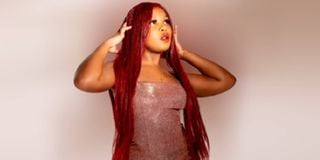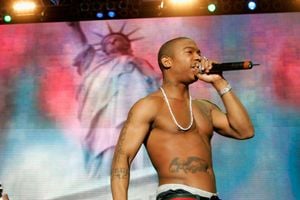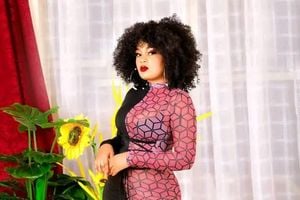Happening now: Liveblog: Final day of DP Rigathi Gachagua impeachment trial

Dyana Cods, the 23-year-old Kenyan dancehall star.
By the time the music video was pulled down, over a disagreement, Dyana Cods, the 23-year-old Kenyan dancehall star whose song ‘Set It’ has become a sensation had over six million views.
In the last two months, the audio alone has 1.6 million views, and the song keeps going viral. On TikTok, the “Set It” electrifying dance challenge has quickly gained traction.
To the eyes of fans, she is a star, but to Dyana, she is a young woman from a humble background who has always known that music is her calling.
The musician describes herself as “shy and savage.”
Raised in Kisumu and Nairobi, Lifestyle met Dyana at Nairobi’s Umoja estate.
In an interview with Lifestyle, she opens up about dropping out of university to pursue her passion, how she is dealing with the challenges of the music industry as a female artiste, and the viral success of “Set It”, which came after doing 55 songs.
Q: People know your song, but not everyone knows the musician behind it; how would you describe yourself?
Diana is a rapper, singer, songwriter, and performer—sexy, talented, and shy at the same time. But when I am on stage, it is savage mode; it is crazy. Basically, shy and savage. That is Diana.
Q: What are your real names?
My real name is Diana Cods too. It’s just Diana Cods. My parents gave me very unique names. I am Kenyan, from the Luo tribe, but I like to sing in English.
Q: Tell us more about your background—how old are you, and where did you study?
I am 23. I was in school, at the University of Nairobi, but I dropped out to pursue music. I was studying journalism, but at some point, I realised it was not my dream, so I made the bold move to focus on music.
Q: What was the turning point for you to say, “Let me focus on music”?
I was doing journalism from around 2020, and at first, I thought it would be easy, but it was not. I went to Statehouse Girl’s and scored a B- in 2018. I knew deep down that music was my true passion. It was always in my heart, and eventually I had to ask myself what I really wanted out of life. The answer was music.
Q: You have been in the music industry for about five years now. How has the journey been?
It is been a wild ride. The first time I made a mark was with a freestyle on Homeboyz Radio, and since then, My breakthrough came with my recent song, “Set It.”
Q: Speaking of “Set It”, what inspired the song?
The beat, I was inspired by the vibe of the instrumental. When I heard it, I just knew it was fire, and it brought out the savage energy in me. The instrumental always dictates my vibe, and this one was pure magic.
Q: Who produced the beat?
I am signed under Big Beat Africa, so they own the beat and the song. I featured Ajay from Buruklyn Boyz [Kenyan group] on it, but the song is owned by Big Beat.
Q: How does it feel to have a big song you don’t own?
It feels amazing, to be honest. Sure, there are challenges in terms of ownership, but the recognition and the growth that have come with it are unbelievable. It is overwhelming, but in a good way.
The only issue that has taken a toll on me is that the song was pulled down on YouTube.
Q: Did you write the song? What was the process like?
I wrote the chorus first as soon as I heard the beat, but I hit writer’s block and left it for a while. Later, I went back to complete the verses. At some point, I felt like I needed to add another artiste for more clout, so I sent the song to Lil Maina, but he delayed sending the verse. I thought maybe he did not want to feature in the song.
I then sent it to Ajay, who responded the next day, and I knew that was it. We recorded it and released the audio on all platforms, but it did not pick up at first.
Once the song became big, of course, Lil Maina wanted to do the remix, but, you know, management was like, let us do another song, you know? The remix needs an international artiste who can make the song worldwide.
Q: The song was not an immediate hit?
Not at all! The first week, it did nothing in terms of numbers. That is when I decided to promote it on TikTok. A few dancers picked it up, and that is when it blew up. So, that is when I started rushing to do the video.
So, we rushed to scout locations. We reached the video director. We made the payments. We paid for everything. We released the video. It did better than the audio.
Q: How did the video come together?
We shot the video in Jericho [a low-middle neighbourhood in Nairobi], which is where I lived when we moved from Kisumu to Nairobi. It is a place full of art, and many people love shooting videos there.
We scouted locations, got the video director on board. It cost about Sh100,000 for logistics, but the record label took care of everything. I could not afford that.
Q: How did the song perform after the video dropped?
It did way better than the audio. In less than a week, we hit a million views!
I did not expect it, especially since we had taken some time before releasing the video.
But once it dropped, it went straight to number one and stayed there for a month.
Q: Have you made any money from the song yet?
Not really. I had not monetised my YouTube channel before the song blew up because my previous channel got hacked.
I was in the process of monetising when this song took off. It takes about three months to get YouTube verification, so I have not made any money from streaming yet, I make money from gigs.
To be honest, I do not see myself making money anytime soon. This song caught me off-guard after it became a hit.
Ajay and my team had an agreement to split 10 percent with him, but after the song became a hit, the distribution company he had initially signed to had unfinished business. So, the distribution company saw that this guy (Ajay) is, like, in the top song, and he owes them and they had unsolved businesses, so they came for me. They started bullying me. They were like, I give them my song to put on their site because they thought I was a small artiste, like there’s no one on my team.
We refused because we own the song. The case is in court.
Q: What advice would you give to upcoming artistes based on your experiences?
My advice is to make sure you sort out your split sheets before releasing any music.
No matter how close you are to other artistes, have everything in writing. People will come back asking for more after a song blows up, and that can lead to a lot of drama.
Q: How was your childhood?
I had a humble upbringing. I spent part of my childhood in Kisumu before we moved to Eastlands in Nairobi. It was a simple life, but I never lacked anything, and it was amazing in its own way.
Q: Are your parents supportive of your music career now?
At first, they weren’t too keen on it. They wanted me to focus on school. But now that things are working out, they see the potential in music and are more supportive.
Q: What are some of the challenges you’ve faced as an upcoming artiste, especially as a woman?
The biggest challenge has been getting gigs and revenue to fund my lifestyle. And to look like an artiste, it is very important to look a certain way. Getting constant money to fund that lifestyle is not easy.
There is this idea that female artistes have more opportunities, but many of them are just for show. It is hard to tell what is real and what is fake. Another challenge is the lack of mentorship in the industry, which can lead young artistes to make wrong choices, like falling into drugs and alcoholism.
Q: Who has mentored you?
I have been fortunate to have people like Wakadinali and Big Beat Africa guide me.
They have been serious about music and have always advised me on who to hang out with and who to avoid.
I have an upcoming project with Femi One. I am very excited about it because you find there is not much female collaboration in the hip-hop industry.
Q: What’s your style of music?
I am versatile. I don’t like being boxed into one genre. If it is dancehall that is trending, I will do it. I adapt to the trends. I would like to work with Bien, Nviiri, Ssaru, and Femi One. Internationally, Burna Boy, and Wizkid, are my dream collaborations.
Q: Lastly, what’s a day in your life like?
My day starts with a prayer because I am very spiritual.
So, the funny thing is, my parents, don't push Christianity on you.
At some point, I was an atheist until in high school when I had an encounter with God, and it changed everything and I became a true believer.
The next thing I do is hit the gym, which helps with discipline.
I work out for about an hour, four times a week. After that, it is either writing music or handling other aspects of my career.
I am all about balance, spiritual, physical, and creative.








